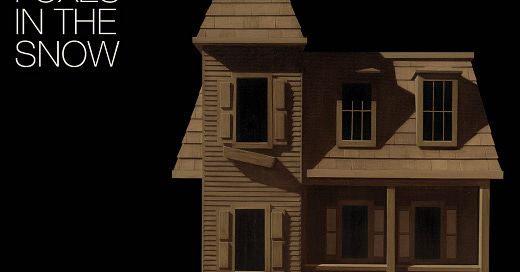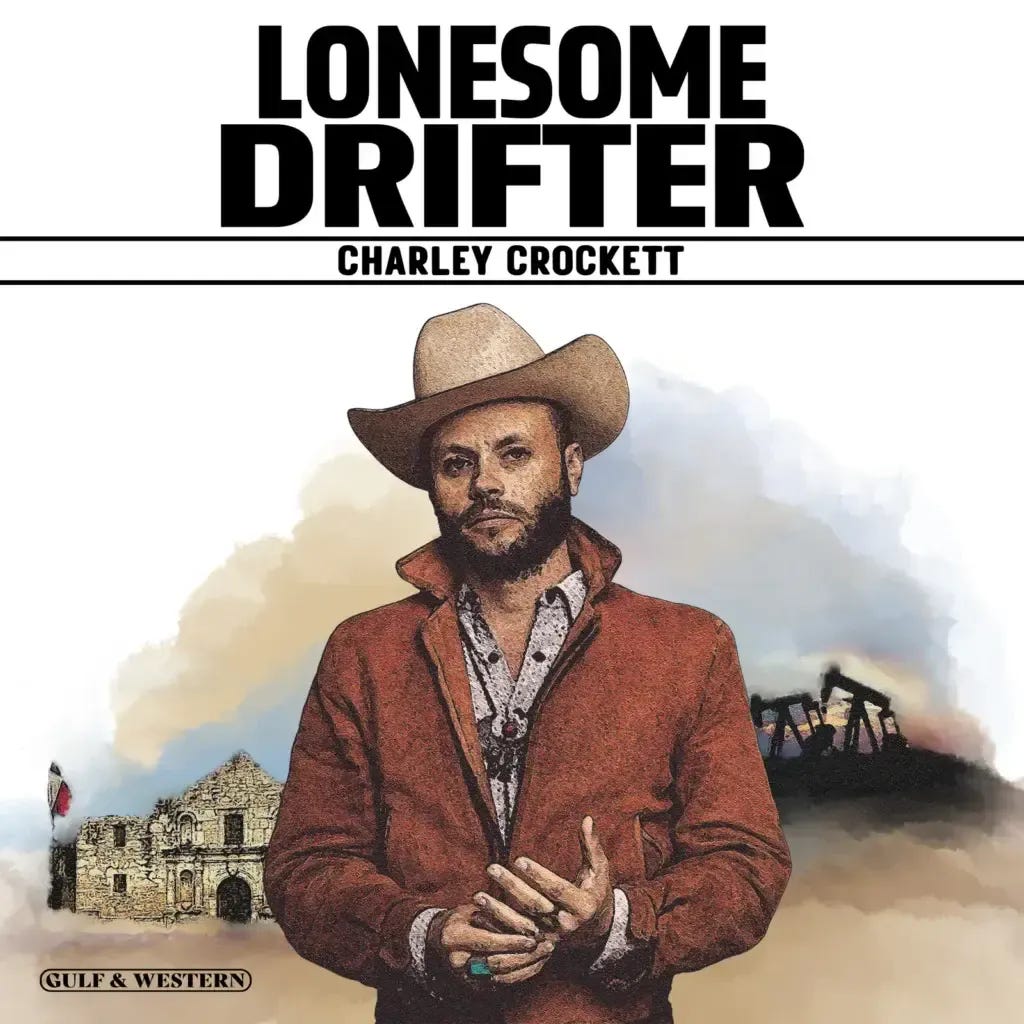Lonely Boys
On a new collection of unvarnished solo recordings, Jason Isbell processes his divorce. Meanwhile, Charley Crockett creates a widescreen western about drifters, ramblers, and itinerant crooners.
Jason Isbell - Foxes in the Snow
There are a handful of lyrics on Foxes in the Snow— an intimate, unaccompanied record from Jason Isbell— that might stop you in your tracks. Perhaps the most disarming, at least for anyone who’s followed Isbell’s story so far, is this line from “Gravelweed”: “And now that I live to see my melodies betray me/ I’m sorry the love songs all mean different things today.”
Ever since releasing his breakthrough album Southeastern in 2013, Isbell has been considered one of the most gifted songwriters of his generation— a reputation built not only on his skillfulness but also his candor, the vulnerability he’s exhibited in writing unflinching songs about his battle with addiction. Love songs have always been an important part of that narrative.
No Jason Isbell song is more beloved than “Cover Me Up,” which isn’t just a harrowing narrative about the earliest days of his recovery— it’s also a hymn of devotion to the singer and songwriter Amanda Shires, to whom Isbell attributes his decision to seek recovery in the first place.
Isbell and Shires eventually married, and roughly a decade later, they divorced. In a time-honored singer/songwriter tradition, Isbell has cut an entirely acoustic album, filled with raw, blood-letting lyrics, to process this romantic dissolution; Foxes in the Snow exhibits the level of candor that is now customary for Isbell, chronicling— often uncomfortably— all the ways in which those love songs for Shires have taken a doleful new meaning.
It’s impossible to talk about these new songs without connecting them to Isbell’s personal life— partly because, in Isbell’s songwriting, autobiography has always been assumed, and partly because the album is scattered with barbs that feel like they couldn’t possibly be addressed to anyone but Shires. It may also be worth noting that the cover art for Foxes in the Snow is a painting by artist Anna Weyant, to whom Isbell has been romantically linked in the days following his divorce.
Given how fast things have moved since Isbell and Shires divorced— how quickly Foxes in the Snow was assembled and released— it should come as no surprise that the album doesn’t quite have the polish or sophistication of the best Isbell records. Stephen Thomas Erlewine rightly likens the album to “an extended exhale,” calling it “an album Jason Isbell needed to get out of his system.” With its unvarnished sound and confessional lyrics, Foxes in the Snow cannot help but feel therapeutic.
The demo-ish quality of the music is appealing in its off-handedness, even as it sometimes obscures the layers in Isbell’s writing. Opener “Bury Me” initially seems like a creative writing exercise— Isbell’s crack at writing an outlaw country anthem— but a closer listen reveals something clever going on in the chorus: Isbell neatly summarizes the arc of his life by singing about three different kinds of bars—the kind he sings, the kind he used to visit for drinks, and the kind that traps him in a prison of his own making.
That song provides early evidence that not everything on Foxes in the Snow will be presented as straightforward memoir— and yet even when Isbell takes creative liberties, it’s hard not to interpret his words as unadorned confessions. An early highlight is “Eileen,” and while there’s no telling whether Eileen is a real person or a construct, there’s really only one way to take it when Isbell sings, "“My own behavior was a shock to me/ I never thought I’d have the nerve.”
The uncomfortable truth about Foxes in the Snow is that many listeners will approach it with voyeuristic intentions, hopeful to glean some details about what went wrong between Isbell and Shires— a hope that Isbell frequently indulges. “Gravelweed” is a painful sequel to “Cover Me Up,” both admitting how he once needed Shires but also positing that he needs her no longer: “I was a gravelweed and I needed you to raise me/ I’m sorry the day came when I felt like I was raised.”
A couple of other songs are nearly as bruising. In “Good While it Lasted”— its title could have been the name of the entire album— Isbell sings about dashed contentment. “For a minute in the afternoon, I almost didn’t think of you/ and it was good while it lasted” he sings, echoing the conceit of Bob Dylan’s classic breakup tune “Most of the Time.”
And then there’s “True Believer”— the song least bound by pretense or politeness, and most discomforting in its literalism and directness. Here, Isbell spits poisonous profanities, his voice dripping with resentment: “All your girlfriends say I broke your fucking heart, and I don’t like it.” It’s an ugly moment made uneasier when Isbell casts his vengeful streak as a moment of personal triumph: “Just when you think that I’m beaten, I get up every time.”
Such undisguised honesty has always been key to Isbell’s appeal— though “appeal” may be the wrong word for it on Foxes in the Snow, an album that is certainly potent but also prickly, caustic, and frequently unflattering. With time and distance, a writer of Isbell’s stature may sift through this wreckage and find real wisdom— even grace. For now, Isbell answers any desire for voyeurism with a willingness to bristle and unsettle. It’s hard to imagine a more disquieting album coming out of this rupture— at least until a new Amanda Shires album drops.
My rating: 7 out of 10.
Charley Crockett - Lonesome Drifter
Charley Crockett— the hard-working Texas troubadour who claims a shared lineage with frontiersman Davey— has always been drawn to the larger-than-life mythology of the American West. Just last year he released a terrific album called $10 Cowboy, and now he’s back with Lonesome Drifter, which leans heavily into the imagery of ramblers, gunslingers, and itinerant country crooners. It’s a collection of tall tales that congeals into a widescreen Western epic— and it’s the most delightful album Crockett’s made yet.
Maybe there’s something pointed in Crockett’s decision to double-down on his love of outlaw lore. Proudly, even stubbornly independent, Crockett has finally signed with a major label (Island) and brought in a big-name producer (Shooter Jennings) to guide the proceedings— but if Lonesome Drifter sounds marginally richer and more colorful than previous Crockett releases, it remains fully committed to the traditionalist Texas country the singer is known for. Fans fearing any concessions to the Nashville mainstream can rest easy.
Of course, for Crockett, traditionalism has never been a codeword for stodginess or conservatism. His albums revel in cinematic storytelling and sly cross-pollinations of country, rock, and blues, all bound together by simmering, soulful grooves. Stephen Thomas Erlewine summarizes Crockett’s appeal this way: “Where other country artists who've cut their teeth on the Americana circuit value the appearance of authenticity, Crockett opts for inventions, imaginations, and half-remembered truths, creating albums that play like midnight movies.”
Crockett declares his independence with an early-album standout called “Game I Can’t Win,” a rousing piece of self-mythology where the singer expresses his solidarity with the old-timey bank robbers and card cheats who held strong against The Man— and while the song doesn’t explicitly call out Crockett’s outsider status within the country music industry, it's telling that The Man is portrayed here as a cohort of Nashville bankers. It’s immediately Crockett’s unofficial theme song, capturing everything that’s irresistible about his pugnacious spirit.
Crockett’s love of vintage country extends not just to imagery but to economy of language— and on several songs here, he demonstrates his ability to create entire storylines within just a few couplets. “Easy Money,” which may or may not be autobiography, opens with a perfectly pithy tribute to maternal sacrifice: “Mama's air conditioning went out in July/ She bought me this guitar, never said why.”
While Crockett’s songs are most effective when they’re grounded in particular tropes and images, there’s always a philosophical streak underlining his stories. “This Crazy Life” is as lush and delicate as a Bobbie Gentry tune— and its big-picture musings might almost seem platitudinous were they not spiked with barbs of self-reflection: “And darling, you know I care for you/ Though I’m not too good with love.”
Such moments of intimacy provide emotional depth, helping to balance the more mythic qualities in Crockett’s Western epics. His small-scale human stories are presented with a delicate touch, but when the cameras pan out for widescreen storytelling, Crockett and Jennings accommodate with flourishes of confidence and swagger— a rambunctious electric guitar solo in “Lonesome Drifter,” Ennio Morricone ambiance in “The Death of Bill Bailey,” galloping banjo in “Game I Can’t Win.”
Crockett obviously has a vast knowledge of the musical lineage he’s descended from, and one of his great gifts is choosing cover songs that perfectly fit within the broader context of his albums. On Lonesome Drifter, his selections enhance both the lonesome heart and bristling attitude of the originals— as well as his great musical dexterity: The Tanya Tucker favorite “Jamestown Ferry” has its lovelorn lyrics upended by a riotous Dixieland jam, while Patsy Cline’s defiant “Never No More” is rendered as loose-limbed rock.
A final cover closes the album— “Amarillo by Morning,” a timeless Texas tale made popular by George Strait. It’s a classic vagabond anthem, capturing the siren song of the open road, acknowledging both the freedom and the cost of living unencumbered. “I ain’t rich, but Lord, I’m free,” Crockett sings. He’s never sounded freer than he does on this outstanding record.
My rating: 8 out of 10.







Finally, some common ground! I was very excited by Isbell's album, though, on the first few listens, disappointed. Perhaps it's the profanity that appears at times; I've grown prudish with middle age. But it felt raw in the way that is unfinished not gritty. I love Crockett's shotgun-style to recording. I'm listening to Zach Bryan's last full-length now and wondering how he can manage to be so prolific, as if the songs just wrote themselves, like with Springsteen. Crockett has that same rapid-fire clip to his music. They're not deep-thinkers, but they're great to listen to with friends at a cookout or in your living room alone, with a bit of a grin on your face.